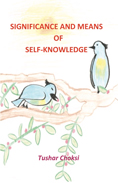
 |
In a small book of essays and stories, the focus is on suffering and how to expand beyond such suffering. Utilizing such sacred texts as the Upanishads, Vedas, Bhagavad Gita, and Brahma Sutras, the author takes us through wisdom teachings and how to utilize these in our everyday lives. Here, we are led to ways of self-examination from the beginnings of our own self-ignorance to that of happiness. Along the way, the reader will be introduced to Vedant philosophies with the focus on non-dual consciousness, letting go of desire and sorrow, and delving beyond samsara. This can be accomplished through contemplation, meditation, and paying attention. Focusing on the dharma provides the basis for such values as does being in a satsang where one can work with others towards growth and spirituality.
The author reveals the importance of being a “good virtuous human being” that he received through the teachings and being raised by his parents. These values led to his ongoing spirituality, leading him to focus on his ongoing studies and teaching of others. This value is seen in this work through his beliefs and hope for humans and for the focus on the necessity of compassion. The teaching stories add to the work as a way to humanize the teachings in real-life adventures. The book is timely for the needed focus, no matter what the belief system, on ways to improve one’s self with body and mind, with family, and with necessary daily practices. At times, the work becomes rather congested, and the editing problems can be distracting. However, the heart of the book is very apparent throughout the readings, and it is a good basic tutorial.